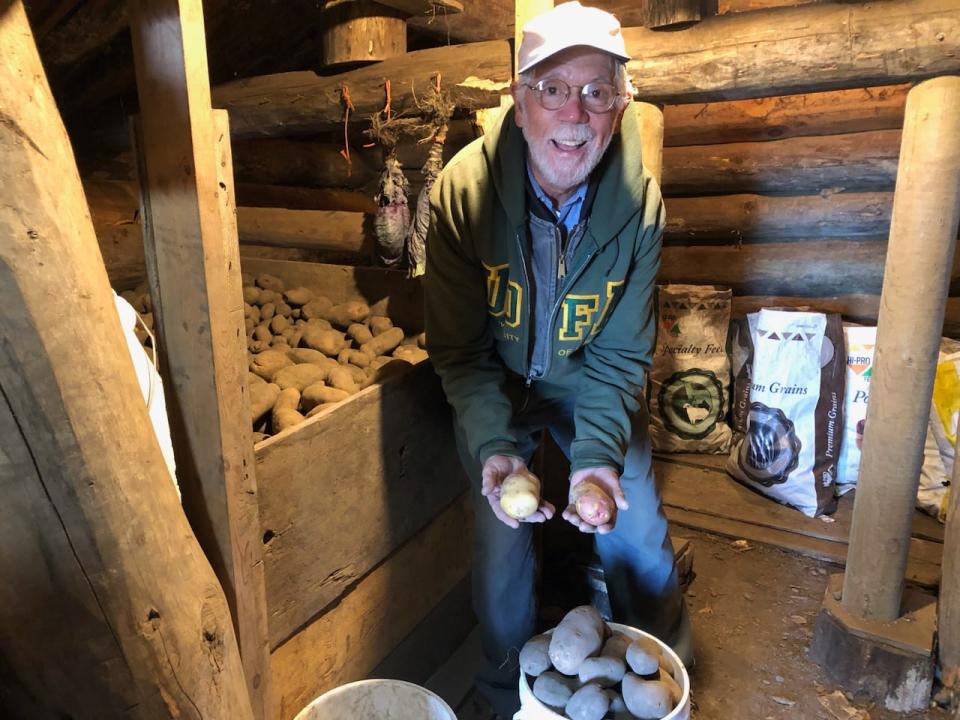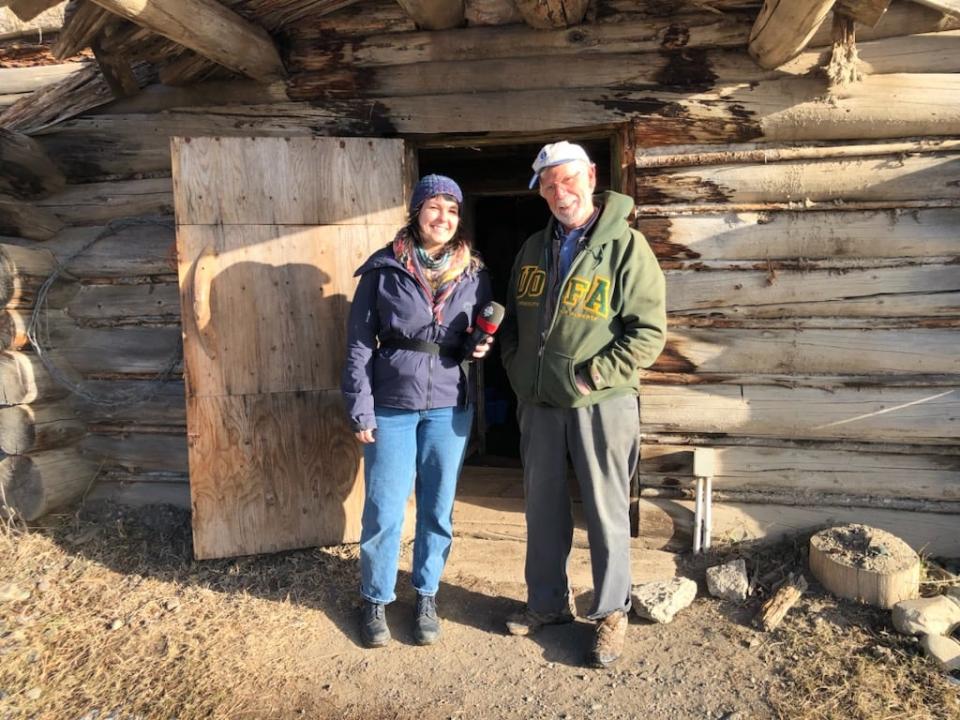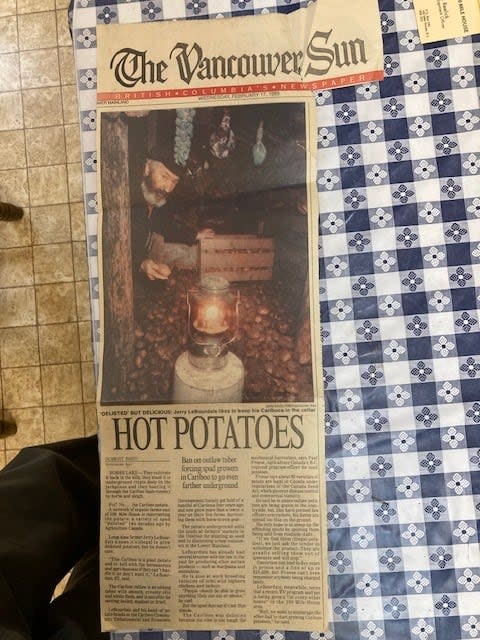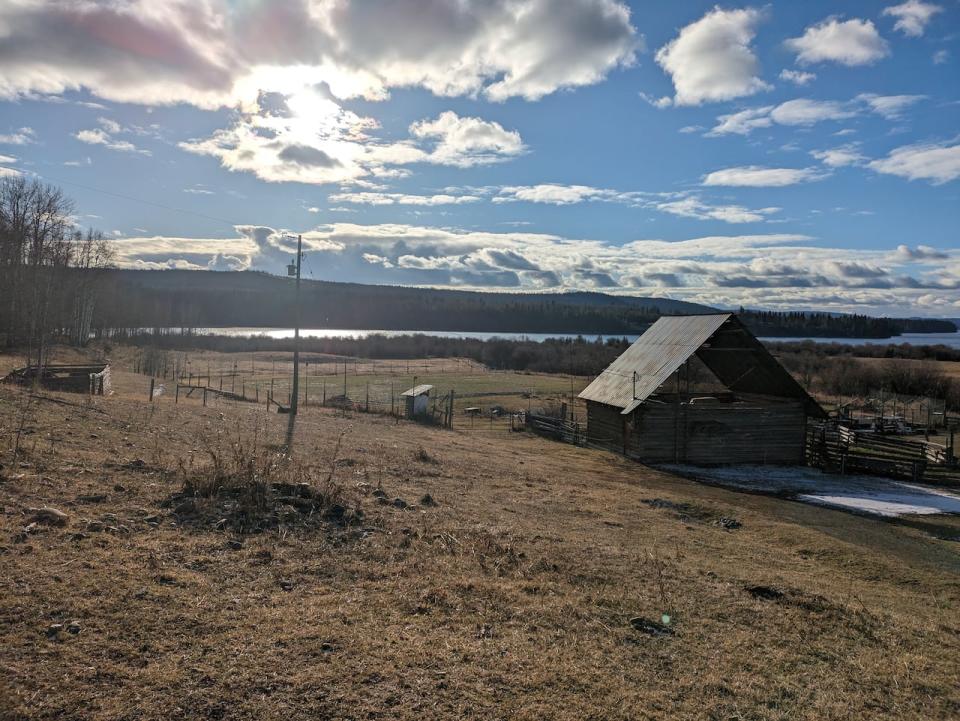A British Columbia farmer who grows a banned potato variety says it’s important to preserve the resistant variety, even if it’s not suitable for large-scale commercial production.
Rob Diether, 70, specializes in growing potatoes at the Horse Lake Community Farm Cooperative, located 115 kilometers north of Kamloops.
Inside a cellar on the farm, Dieter holds one of the potatoes that has made the organic farm famous throughout the country. The Cariboo potato has a yellow skin and what he describes as “beautiful pink spots.”
“These are very special potatoes. They’re hidden in the back to keep them away from anyone who doesn’t know how special they are,” he tells CBC News.


Rob Diether, 70, holds two Cariboo potatoes in his hand at the cooperative farm he helped form nearly two decades ago. Commercial cultivation of Cariboo potatoes is not permitted, but Diether says the fact that his farm continues to grow them reflects the need to continue sustainable farming practices. (Jordan Tucker/CBC)
“They look very attractive and the flesh is quite yellow too. They are beautiful potatoes. We have been growing and saving this seed since the mid-70s.”
The Cariboo’s claim to fame is that it is illegal. Cariboo is not allowed to be grown for commercial use and federal authorities have threatened the small cooperative with a $10,000 fine.
And yet, the potato has been grown for decades on the farm, and Diether says efforts to preserve a potato that authorities have long decertified reflects the need to practice sustainable, small-scale agriculture.
The potatoes have sparked interest as far away as Corner Brook, NL, and the farm regularly receives correspondence from those who want to try the tuber.


CBC Associate Producer Jordan Tucker and Rob Diether stand outside the basement of the Horse Lake Community Farm Cooperative. (CBC)
“‘Enclosed: Please find $2 to cover the expenses of some of your great efforts and perseverance in dealing with the government’s agricultural departments,'” Diether says, reading from a stack of dozens of letters.
“That’s from someone…in Calgary.”
Diether says the interest in his “banned” potatoes may indicate a growing interest in farming, and he hopes new farmers will join the cooperative to continue sustainable farming for generations to come.
“The main idea is … to preserve this unique piece of agricultural land and ensure that it remains in agricultural production,” he told CBC News. “It’s not sold or subdivided or just turned into someone’s property. That’s why people belong to the cooperative.”
The farmer considers it “quite absurd” that potatoes have been written off due to their suitability for small farmers.
How to decertify a potato
The BC Food History blog, run by a group of university professors, says the Cariboo potato was developed by the Federal Potato Research Center in Fredericton, N.B., and performed “unusually well” in the harsh climate of the interior of BC during the 1960s and 1960s. 70s.
Diether says that despite the potato’s hardy nature, its thick vines and feathery foliage made it unsuitable for mechanical harvesting, as the vines would become tangled in mechanical pickers.
He added that the Cariboo potato was also sensitive to sunlight, which would cause the potatoes to turn green if they sat on the supermarket shelf for too long.


A 1993 Vancouver Sun clipping shows CEEDS founder Jerry LeBourdais and his quest to preserve the Cariboo potato. (Submitted by Rob Diether)
The blog says that the potato was “decertified” by Agriculture and Agri-Food Canada (AAFC) in 1976, which meant that commercial seed potato producers would lose their license if they continued to grow them.
AAFC says the Cariboo potato was first registered in 1967 and its registration status is currently listed as “cancelled.”
CBC News contacted AAFC but did not receive a response in time for publication.
Dieter says that despite the threat of a fine, AAFC had “declared a truce” with the farm that held for decades.
Find more cooperative farmers
Dieter says it was not unusual for AAFC to replace potato varieties with ones they considered improved.
The farmer has been working in the fields since the mid-1970s, when he joined the Community Improvement and Economic Development Society (CEEDS), which he describes as a “back-to-the-land farming commune.”
He says they first obtained Cariboo potato seeds in the early ’80s, when an old farmer named Tommy Wint obtained four seeds “by hook or by crook” for enterprising members of the commune.


The Horse Lake Cooperative spans nearly 54 hectares of land north of Kamloops. It is supported by several people who have purchased shares to preserve the land as farmland. Potatoes are only grown on a small part of the property. (Jordan Tucker/CBC)
Since then, CEEDS, which helped start the Horse Lake Cooperative in 2006, has grown a veritable bounty of Cariboo potatoes from those first four seeds. The farm grows tons of potatoes on about half an acre (0.2 hectares) of land.
Dieter says that lately, many people have been approaching him at farmers markets for advice on growing plants in small containers and gardens, something he says reflects people’s growing interest in growing their own food.
“Maybe it wouldn’t be on the scale that we’re doing things on, but I still think it’s wonderful,” he said. “We are encouraging young people to, in a way, replace us.”